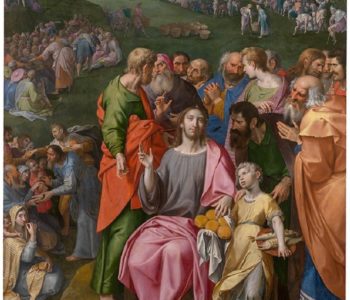 The miracle of the loaves and fish is the kind of Bible story that keeps me awake at night. It’s not the fact that Jesus managed to feed everyone by miraculously multiplying the available provisions, but I am driven to distraction by the circumstances that required His assistance in the first place. If I were an editor vetting this story for publication, it never would have made the evening edition.
The miracle of the loaves and fish is the kind of Bible story that keeps me awake at night. It’s not the fact that Jesus managed to feed everyone by miraculously multiplying the available provisions, but I am driven to distraction by the circumstances that required His assistance in the first place. If I were an editor vetting this story for publication, it never would have made the evening edition.
In the wee hours of morning when I am losing sleep over whether I subscribe to a literal interpretation of this story or a more symbolic one, I can’t help fantasizing what it might have been like to take the gospel writers to task over what is, at best, shoddy reporting.
“What’s the matter with you, Mark?” I’d begin in Perry White fashion. “I send four of my best guys out to cover this event and you come back with a ten-verse account that ignores at least three of the five W’s of journalism! Who are these people? When and where did this occur? Do you honestly expect me to believe that 4,000 folks would travel from far and wide to hear Jesus speak without bringing along a sack lunch? Why would anyone do that, Mark? Did you even bother to ask?”
Mark would shuffle his feet a little and clear his throat. “Well, I know John said there was a little boy who gave up his loaves and fish for the group…”
“Yeah, I read John’s version of the story as well as Matthew and Luke’s,” I’d cut in, not giving him a chance to explain. “I don’t understand how the four of you can file similar stories and yet none of you can come up with a consensus as to what actually happened. You say there were 4,000 people in attendance. One of the other guys said it was 5,000. Did you bother trying to find out who was in charge of the door to get anything close to an official head count?”
“Well…no,” Mark would mumble.
“And yet you know how much food was left over and where Jesus went next,” I’d shake my head at the lack of consistent facts. “Now about this kid that John got ahold of. Was he there alone? Where were his parents? How did all of you miss this angle? Did it even occur to you that this kid could be the key to the whole thing! I thought you said this Jesus fellow was the Son of God and can do anything! Why does he need the kid’s snack pack in the first place?”
Mark wouldn’t have an answer for that. Neither would the other three and it’s the part that bothers me more than I care to admit. This is the second food related miracle in which Jesus needs a prop. The first, of course is the wedding at Cana in which He turns water into wine and even though He’s already healed the sick, calmed the seas and exorcised at least one demon all by Himself…He now requires supplies in order to do something miraculous?
It doesn’t make any sense and it won’t until about 15 minutes before my alarm goes off when it occurs to me that he’s enabling us to be part of His work. The divine is really in the details. Whether we are pooling our resources in order to make sure everyone has their fill or sacrificing what we already have in hopes that He can do more with it, the miracle of the loaves and fish is about more than the magical moment in which Jesus feeds the masses – it’s an invitation to be part of the miracle. It’s like the song says: “We are many parts. We are all one body and the gifts we have, we are given to share.”
It’s the explanation that satisfies enough for me to get a quick catnap before getting up and starting my day, but I willingly admit, I haven’t riddled out all of the answers. I still don’t know why no one else thought to bring any food along or why they expected Jesus to do something about it, but that’s a problem for another day. As a journalist, I have learned that there are many angles to a story and when it comes to the Gospel narratives, I have learned that every detail is critical to the plot. While some will focus on a literal interpretation and others prefer a more symbolic one, I see it as an invitation to take action because sometimes, even a miracle needs a hand.
Today’s readings for Mass:
1KGS 12:26-32; 13:33-34; PS 106: 6-7AB, 19-20, 21-22; MK 8:1-10
